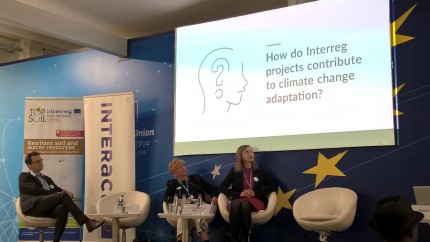AMIIGA at COP24: Groundwater and climate change links
COP24 as an opportunity for AMIIGA team to expand a knowledge on links between groundwater and climate change
Although AMIIGA project is not strictly connected with the aspect of climate change, researchers in AMIIGA team are interested also in this aspect. Increased variability in precipitation and more extreme weather events caused by climate change can lead to longer periods of droughts and floods, which directly affects availability and dependency on groundwater. In long periods of droughts there is a higher risk of depletion of aquifers, especially in case of small and shallow aquifers. Moreover climate change does not only affects groundwater quantity, but also its quality.
Because of that – we followed the COP24 (https://cop24.gov.pl/) process with interest. As Central Mining Institute (GIG) is located in Katowice, we used this opportunity to participate in some events and side-events. We had a pleasure to participate in workshop organized on 8th of December by the Interreg Climate Change Network - presenting "Interreg contribution to climate change adaptation: discover results and funding opportunities". The aim of this session was to show examples of relevant projects, and to provide the audience with information about how to benefit from the current funding research opportunities available.
The session started with a brief introduction to ‘what is Interreg’ and a presentation of the Interact Climate Change Network. Then, speakers representing different climate change projects were invited to present their experiences as lead partners:
- Dr. Anna Starzewska-Sikorska, from the Institute of Ecology of Industrial Areas in Poland, introduced two project examples from the Interreg Central Europe Programme: CIRCUSE and LUMAT.
- Mr. Rolf Johnsen from Central Denmark Region presented the main features of the TOPSOIL project from the Interreg North Sea Programme (link: https://northsearegion.eu/topsoil/) .
Finally, Dr. Monika Strojecka-Gevorgyan, from the Ministry of Investment and Economic Development of Poland expressed the importance of Interreg as a funding instrument for climate change projects. Two key examples were mentioned: FramWat dealing with natural small water retention measures, and CE-HEAT focusing economic eligibility of waste heat exploitation.
At the end of the session, there was an opportunity for a backstage discussion and a comparison of the experiences of different projects - AMIIGA experiences were presented to Mr. Rolf Johnsen from TOPSOIL and the potential opportunities of exchange of learning experiences were discussed.
We would like to thank for the opportunity for learning during this session and participation in discussion.
Description of the session – based on: http://www.interact-eu.net/#news

